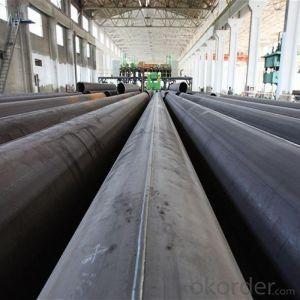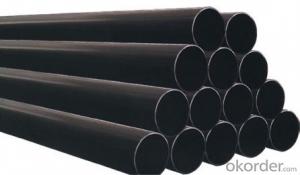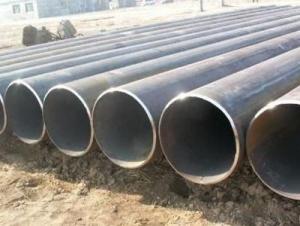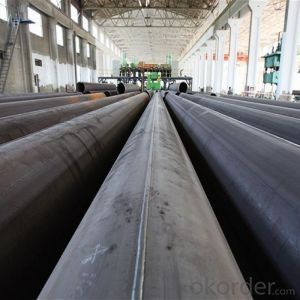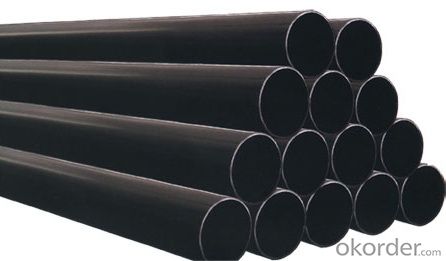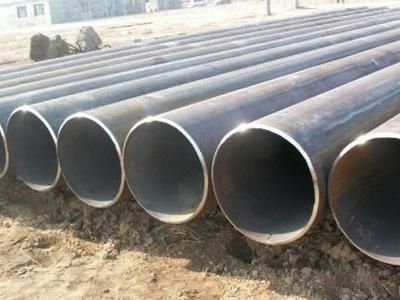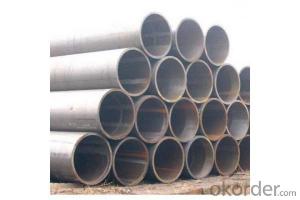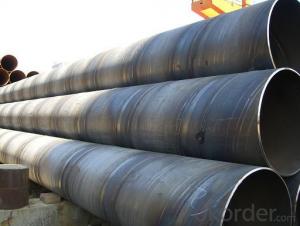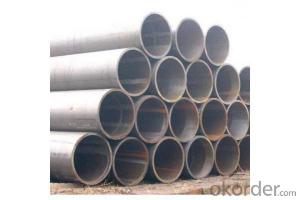API SSAW LSAW CARBON STEEL PIPE LINE OIL GAS PIPE 58''
- Loading Port:
- Tianjin
- Payment Terms:
- TT OR LC
- Min Order Qty:
- 5 m.t.
- Supply Capability:
- 3000 m.t./month
OKorder Service Pledge
OKorder Financial Service
You Might Also Like
Packaging & Delivery
Packaging Detail: | standard export packing or as customer's requirement |
Delivery Detail: | within 10 - 30 days |
Specifications
Spiral Welded Steel Pipes and Tubes
1.Material:Q195-Q235
2.Length:1-12m
3.WT:1.0-14mm
4.O.D.:20-273mm
Spiral Welded Steel Pipes and Tubes
Product Description:
1.Material : Q235,Q345,L245,L290,L360,L415,L450,L485,GrB,X42,46,X52,X56,X60,X65,X70,X80,X100
2,Standard: SY/T5037-2000,GB/T9711-2011,API Spec 5L PSL1/PSL2,ASTM A252\A53,ISO3183,DIN17172,EN10217,JIS G3457,AWWA C200,ASTM A139,ASTM A671,ASTM A672
3.Wall thickness: 3.0mm-30mm
4.Outer diameter: φ168mm-3020mm
5,Length: 5m-12m or as your requirement
6,Corrosion protection standard: DIN30670,DIN30671, AWWAC210, AWWA C203, SY/T0413-2002,SY/T0414-2002
7,Application: Oil, gas, natural gas, water pipe, thermal electricity pipe, steel structure engineering, etc
Q195-q345 Material Steel Pipe's Materials
Elements | Chemical Compsition% | Mechanical Property | ||||||
C% | Mn% | S% | P% | Si% | Yield Point (Mpa) | Tensile Strength(Mpa) | Elongation | |
Q195 | 0.06-0.12 | 0.25-0.50 | <0.050< span=""> | <0.045< span=""> | <0.030< span=""> | >195 | 315-430 | 32-33 |
Q215 | 0.09-0.15 | 0.25-0.55 | <0.05< span=""> | <0.045< span=""> | <0.030< span=""> | >215 | 335-450 | 26-31 |
Q235 | 0.12-0.20 | 0.30-0.70 | <0.045< span=""> | <0.045< span=""> | <0.030< span=""> | >235 | 375-500 | 24-26 |
Q345 | <0.20< span=""> | 1.0-1.6 | <0.040< span=""> | <0.040< span=""> | <0.55< span=""> | >345 | 470-630 | 21-22 |
Packaging & Delivery
Packaging Detail: | Normal exporting packing,in container or bulk vessel or as per clients' request |
Delivery Detail: | 2 months after confimed contract |
Specifications
Large Diameter API 5L X70 PSL2 LSAW Steel Pipe
Grade: X42, X46, X50, X52, X60, B, C
OD: 1.5"-28"
WT: SCH10-SCH160
Large Diameter API 5L X70 PSL2 LSAW Steel Pipe
Specifications:
u Standard: API 5L
u Grade: B, C, X42, X46, X50, X52, X56, X60, X65, X70, X80
u OD: 1.5"-28"
u WT: SCH10-SCH160
u Length: 5-12m
u Ends Finish: plain end, bevel end, grooved end
u Surface Treatment: bare, black varnished, oiled finish, red color, anti-corrosion, 3PE, FBE or epoxy coating
u Technique: hot rolled or cold drawn
u Application: api 5l steel pipe for conveying oil, water, gas
u Invoicing: based on theoretical weight or actual weight
u Payment Terms: L/C at sight, T/T or Western Union
u Trade Terms: FOB, CFR, CIF
u Certification: ABS manufacturing assessment, ABS design assessment, API 5CT, API 5L, DNV manufacturer certificate, ISO9001 quality management system certificate, ISO14001 environment management system certificate, GB/T28001 occupational health and safety management system certificate, A1 class manufacturing license of special equipment certificate, CCS, GL, LR, SGS, TüV, PDE
- Q: How are steel pipes used in the power generation industry?
- Steel pipes are extensively used in the power generation industry for various purposes, such as transporting steam, water, and other fluids in power plants. They provide a reliable and durable solution for the high-pressure and high-temperature conditions found in power generation systems. Steel pipes are also used for the construction of boilers, condensers, and heat exchangers, ensuring efficient heat transfer and energy production. Additionally, steel pipes are employed in the exhaust system of power plants to safely and efficiently discharge emissions. Overall, steel pipes play a critical role in the power generation industry by facilitating the transportation of fluids and contributing to the reliable and efficient operation of power plants.
- Q: Can steel pipes be used for geothermal heating systems?
- Yes, steel pipes can be used for geothermal heating systems. Steel pipes are commonly used in the construction of geothermal systems due to their durability, high heat transfer capabilities, and resistance to corrosion. They are capable of withstanding the high temperatures and pressure associated with geothermal heating systems, making them an ideal choice for transporting and distributing the geothermal fluid.
- Q: How are steel pipes used in irrigation systems?
- Steel pipes are commonly used in irrigation systems to transport water from a water source, such as a well or a reservoir, to the fields or plants that need to be irrigated. These pipes are durable, strong, and resistant to corrosion, making them ideal for withstanding the constant flow of water and the harsh outdoor conditions. They are typically laid underground or above the surface, depending on the specific irrigation system design, and are connected to sprinklers or drip irrigation systems to distribute water efficiently and effectively to the crops or plants.
- Q: What are the different end finishes for steel pipes?
- There are several different end finishes for steel pipes, depending on their intended use and the specific requirements of the application. Some of the most common end finishes for steel pipes include: 1. Plain End: This is the simplest and most common type of end finish, where the pipe is cut square at both ends without any additional treatment or threading. Plain end pipes are typically used for low-pressure applications or when the pipe will be connected using welding methods. 2. Beveled End: A beveled end finish involves cutting the pipe at an angle, usually 30 or 37.5 degrees, to facilitate easier welding and create a stronger joint. Beveled end pipes are commonly used for butt-welding applications, where two pipes are joined together by aligning the beveled ends and welding them. 3. Threaded End: In this end finish, the pipe is threaded at both ends to allow for easy connection with threaded fittings or couplings. Threaded end pipes are commonly used in plumbing and gas distribution systems, as well as for applications that require frequent disassembly and reassembly. 4. Coupled End: Coupled end finishes involve the installation of couplings or connectors at each end of the pipe. This allows for quick and easy connection of pipes without the need for additional threading or welding. Coupled end pipes are often used in oil and gas pipelines or in applications where rapid installation is required. 5. Grooved End: A grooved end finish involves cutting grooves into the pipe's ends and using mechanical couplings or fittings to join the pipes together. This type of end finish is commonly used in fire protection systems, as well as for large-diameter pipes that require quick and efficient assembly. 6. Flanged End: Flanged end finishes involve attaching flanges to the pipe ends, which can be bolted together to create a secure and leak-proof connection. Flanged end pipes are commonly used in applications that require easy disassembly and reassembly, such as in chemical plants or refineries. It is important to note that the choice of end finish for a steel pipe depends on factors such as the application, the required joint strength, the type of connection method, and the compatibility with other system components. Consulting with a professional or referring to industry standards is recommended to ensure the correct end finish is selected for a specific application.
- Q: Are steel pipes suitable for use in chemical plants?
- Yes, steel pipes are suitable for use in chemical plants. Steel pipes offer excellent resistance to corrosion, high durability, and can withstand high temperatures and pressures commonly found in chemical processing. Additionally, steel pipes can be easily welded, making them versatile for various chemical applications.
- Q: Can steel pipes be used for transportation of hazardous materials?
- The transportation of hazardous materials can indeed utilize steel pipes. Steel is renowned for its robustness, longevity, and resistance to rust, which renders it suitable for the management and conveyance of various perilous substances. This encompasses combustible liquids, noxious chemicals, and other hazardous materials. Steel pipes, employed for the transportation of hazardous materials, are frequently custom-designed and fabricated to comply with strict safety regulations and industry standards. They are typically forged from top-notch steel alloys and subjected to stringent tests to guarantee their integrity and resistance to leaks or ruptures. Additionally, steel pipes can be manufactured with supplementary protective coatings or linings to furnish an extra layer of security and avert any potential reactions between the hazardous substance and the steel. These coatings can also aid in reducing the risk of corrosion and prolonging the lifespan of the pipes. In summary, steel pipes have an established record in the transportation of hazardous materials due to their inherent strength, durability, and ability to withstand the challenging conditions frequently encountered during transportation. Nonetheless, it is imperative to adhere to proper protocols for handling, storage, and transportation to ensure the safety of both the transported materials and the individuals involved in the process.
- Q: Can steel pipes be used for the construction of transmission towers?
- Yes, steel pipes can be used for the construction of transmission towers. Steel pipes are commonly used in the construction industry due to their strength, durability, and ability to withstand heavy loads. They provide structural support and stability required for transmission towers, making them a suitable choice for this application.
- Q: What is the outer diameter and wall thickness of DN40 steel pipe?
- DN40 pipe diameter 48.3mm diameter, allowable deviation of plus or minus 0.5mm it depends on what you have, the outside diameter of 45, there are other dimensions, you can see the manual
- Q: How are steel pipes joined together?
- Steel pipes are typically joined together using various methods such as welding, threading, and flanging. Welding involves melting the ends of the pipes and fusing them together, creating a seamless connection. Threading involves cutting screw-like grooves on the pipe ends, which are then screwed tightly together using a threaded coupling. Flanging involves adding a flange, a flat plate with holes, to each pipe end, and then bolting them together securely. These joining techniques ensure strong and durable connections between steel pipes.
- Q: Are steel pipes resistant to chemicals?
- Yes, steel pipes are generally resistant to chemicals. They have excellent corrosion resistance properties, making them suitable for transporting various chemicals in industries such as oil and gas, chemical processing, and wastewater treatment. However, the level of resistance can vary depending on the specific type of chemical and the grade of steel used. In some cases, additional protective coatings may be required to enhance chemical resistance.
Send your message to us
API SSAW LSAW CARBON STEEL PIPE LINE OIL GAS PIPE 58''
- Loading Port:
- Tianjin
- Payment Terms:
- TT OR LC
- Min Order Qty:
- 5 m.t.
- Supply Capability:
- 3000 m.t./month
OKorder Service Pledge
OKorder Financial Service
Similar products
Hot products
Hot Searches
Related keywords
